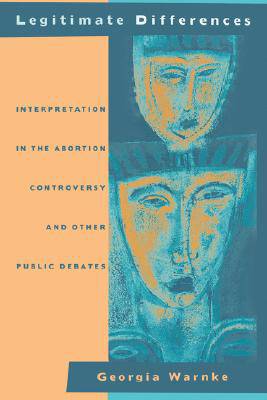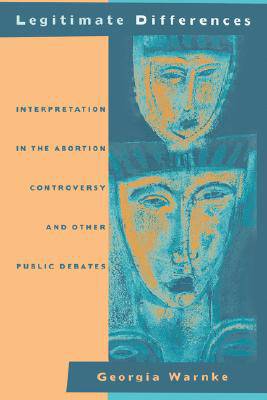
- Afhalen na 1 uur in een winkel met voorraad
- Gratis thuislevering in België vanaf € 30
- Ruim aanbod met 7 miljoen producten
- Afhalen na 1 uur in een winkel met voorraad
- Gratis thuislevering in België vanaf € 30
- Ruim aanbod met 7 miljoen producten
Zoeken
Legitimate Differences
Interpretation in the Abortion Controversy and Other Public Debates
Georgia Warnke
Hardcover | Engels
€ 98,45
+ 196 punten
Omschrijving
Legitimate Differences challenges the usual portrayal of current debates over thorny social issues including abortion, pornography, affirmative action, and surrogate mothering as moral debates. How can it be said that our debates oppose principles of life to those of liberty, principles of liberty to those of equality, principles of equality to those of fairness, and principles of fairness to those of integrity, when we as Americans share all these principles?
Debates over such issues are not, Georgia Warnke argues, moral debates over which principles we should adopt. Rather, they are interpretive debates over the meanings of principles we already possess. Warnke traces the structure of these debates with reference to the work of Jane Austen, Hans-Georg Gadamer, Jürgen Habermas, and Bernard Williams. In separate chapters on surrogate mothering, affirmative action, abortion, and pornography she articulates new understandings of the meanings of some of our principles and shows the equal legitimacy of some different interpretations of the meanings of others. Finally, she suggests that the orientation of American public policy ought to be directed less at finding single canonical interpretations of our principles than at accommodating different legitimate understandings of them. The perspective offered by Legitimate Differences should have a significantly beneficial effect on public discussions.
Debates over such issues are not, Georgia Warnke argues, moral debates over which principles we should adopt. Rather, they are interpretive debates over the meanings of principles we already possess. Warnke traces the structure of these debates with reference to the work of Jane Austen, Hans-Georg Gadamer, Jürgen Habermas, and Bernard Williams. In separate chapters on surrogate mothering, affirmative action, abortion, and pornography she articulates new understandings of the meanings of some of our principles and shows the equal legitimacy of some different interpretations of the meanings of others. Finally, she suggests that the orientation of American public policy ought to be directed less at finding single canonical interpretations of our principles than at accommodating different legitimate understandings of them. The perspective offered by Legitimate Differences should have a significantly beneficial effect on public discussions.
Specificaties
Betrokkenen
- Auteur(s):
- Uitgeverij:
Inhoud
- Aantal bladzijden:
- 225
- Taal:
- Engels
Eigenschappen
- Productcode (EAN):
- 9780520216334
- Verschijningsdatum:
- 5/08/1999
- Uitvoering:
- Hardcover
- Formaat:
- Genaaid
- Afmetingen:
- 163 mm x 237 mm
- Gewicht:
- 503 g

Alleen bij Standaard Boekhandel
+ 196 punten op je klantenkaart van Standaard Boekhandel
Beoordelingen
We publiceren alleen reviews die voldoen aan de voorwaarden voor reviews. Bekijk onze voorwaarden voor reviews.











